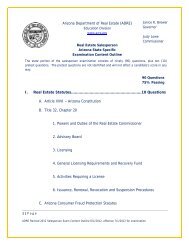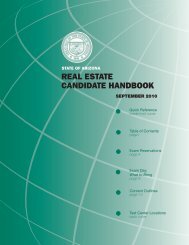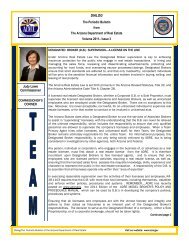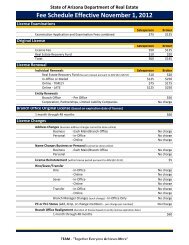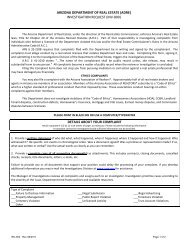Law Book - Arizona Department of Real Estate
Law Book - Arizona Department of Real Estate
Law Book - Arizona Department of Real Estate
You also want an ePaper? Increase the reach of your titles
YUMPU automatically turns print PDFs into web optimized ePapers that Google loves.
107 CHAPTER 28. STATE REAL ESTATE DEPARTMENT R4-28-402<br />
ix. Homeowners Association regulations;<br />
x. <strong>Real</strong> <strong>Estate</strong> Settlement Procedures Act (RESPA); and<br />
xi. Environmental issues.<br />
e. Fair housing. The majority <strong>of</strong> class material concerns equal opportunities in housing, including:<br />
i. Americans with Disabilities Act, ADA architectural designs (construction and development),<br />
and pertinent court cases;<br />
ii. <strong>Arizona</strong> and federal fair housing laws, including advertising, marketing, information, and<br />
enforcement;<br />
iii. Housing developments, deed restrictions, affordable housing, elder housing, zoning, local<br />
ordinances, and disclosures;<br />
iv. Commercial and residential concerns; and<br />
v. Administrative procedures and business practices.<br />
f. Disclosure. The majority <strong>of</strong> class material concerns the following:<br />
i. Licensee’s disclosure obligations to client and others;<br />
ii. Seller’s and buyer’s disclosure obligations to each other;<br />
iii. Common material facts warranting disclosure, and liability for failure to disclose;<br />
iv. Avoiding inadvertent non-disclosures;<br />
v. Transaction documents that should be reviewed;<br />
vi. Common ‘‘red flags’’ in a real estate transaction;<br />
vii. Homeowner associations and buyers’ obligations to homeowner associations; and<br />
viii. Advising buyers and sellers <strong>of</strong> common ‘‘red flags.’’<br />
g. Business brokerage. The majority <strong>of</strong> class material concerns business brokerage including:<br />
i. Business brokerage basics including introducing licensees to business brokerage, associated<br />
terminology, marketing, prospecting, listing, pricing, closing practices, the use <strong>of</strong> contracts<br />
related to and unique to business brokerage, and the application <strong>of</strong> business brokerage<br />
contracts;<br />
ii. Business valuations and appraisals, and establishing an in-depth review <strong>of</strong> proper business<br />
valuation techniques for small, medium, and large businesses;<br />
iii. Tax structure and considerations, tax law, and policy including subjects such as financing<br />
tools available, options available, and tax implications;<br />
iv. Accounting for business brokers;<br />
v. Agency in business brokerages, the use <strong>of</strong> contracts related to and unique to business<br />
brokerage, and the application <strong>of</strong> business brokerage contracts; and<br />
vi. Disclosure issues in business brokerage, including common ‘‘red flags’’ in a business opportunity<br />
transaction, and advising buyers and sellers <strong>of</strong> common ‘‘red flags.’’<br />
h. General real estate. The majority <strong>of</strong> class material concerns real estate, but does not fall within any<br />
<strong>of</strong> the categories listed in subsections (A)(5)(a) through (A)(5)(g), including:<br />
i. Appraisal methodology;<br />
ii. General finance, use <strong>of</strong> financial calculators, mathematics, and managing cash flow;<br />
iii. History <strong>of</strong> development in metropolitan areas; and<br />
iv. Introduction to property management.<br />
6. The <strong>Department</strong> may require an individual applying for renewal to obtain credit hours based upon<br />
significant current issues in the real estate community. The <strong>Department</strong> shall notify licensees <strong>of</strong> a new<br />
requirement by written notice published in printed or electronic format.<br />
7. The <strong>Department</strong> may grant continuing education credit for a course that does not have a certificate <strong>of</strong><br />
approval under R4-28-404 if the applicant demonstrates to the satisfaction <strong>of</strong> the Commissioner that<br />
the course meets the requirements prescribed in R4-28-404 and the course content requirements <strong>of</strong><br />
this Section.<br />
8. An applicant may substitute subject matter hours within a 90-hour broker’s prelicensure course that<br />
meet the criteria for credit under subsections (A)(5)(a) through (A)(5)(h), if taken since the last license<br />
renewal, for the continuing education credit required in subsection (A)(2) or (3).<br />
9. If any change in the continuing education course requirements occurs during a renewal applicant’s<br />
license period and the applicant has fully complied with the continuing education requirement in<br />
effect before the change occurs, the <strong>Department</strong> shall consider the renewal applicant to be in<br />
compliance with the continuing education requirements for the license period.<br />
B. Continuing education waiver. Under A.R.S. § 32-2130, the Commissioner may waive all or a portion <strong>of</strong> the<br />
continuing education requirement or grant additional time to complete a continuing education requirement<br />
when a salesperson or broker submits a written request to the Commissioner and shows good cause<br />
for the waiver or additional time.<br />
1. Good cause may include:<br />
a. A person employed by the state or political subdivision establishes to the satisfaction <strong>of</strong> the<br />
Commissioner that the person’s employment during the prior license period involved real<br />
estate-related matters;



